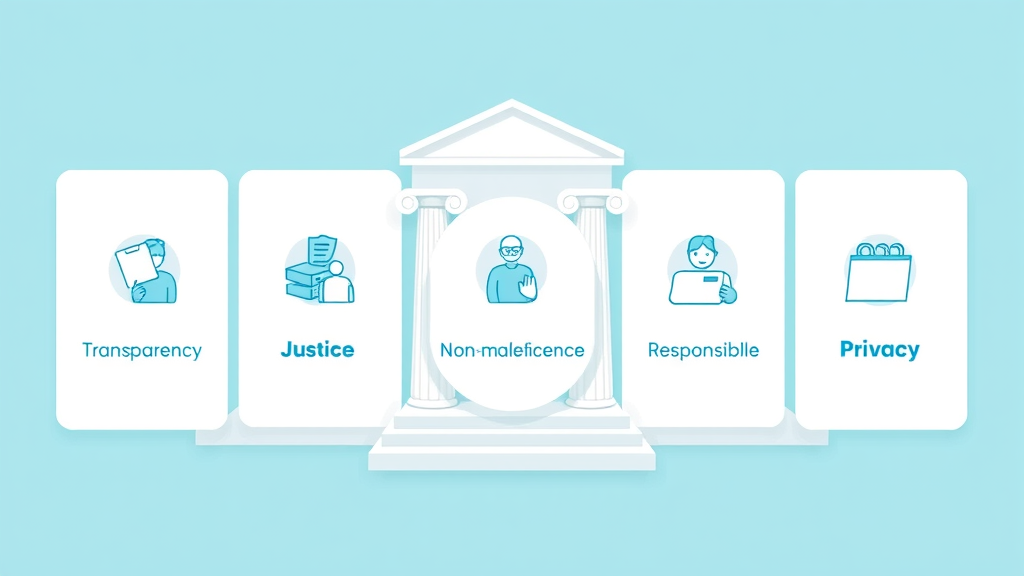Did you know that over 75% of organizations lack a formal AI ethics framework ? As artificial intelligence rapidly redefines our world, the risks from ignoring AI ethics multiply at a staggering pace. If we do not urgently address the ethical implications of AI in business, government, and society, we risk sleepwalking into a future of unchecked discrimination, surveillance, and erosion of human rights. This article shows why it’s critical to act now—providing you with the knowledge and tools to demand responsible AI that benefits humanity, not just technology.
Why AI Ethics Cannot Be Overlooked: Alarming Trends in Artificial Intelligence
The main keyword, AI ethics , isn’t just a buzzword or a matter for academic debate. It is a practical, everyday concern that touches almost every facet of modern life. Businesses incorporating AI tools without ethical guardrails risk launching biased AI models, leading to discrimination in hiring, credit scoring, or even in medical diagnoses. For governments, the absence of a dependable AI ethics framework can mean deploying AI systems that invade privacy or amplify surveillance without sufficient oversight.
Society at large feels these impacts when powerful AI technologies—like generative AI or AI-driven social media algorithms—shape perceptions, spread misinformation, and reinforce harmful stereotypes. These risks become even more significant as AI systems begin making decisions previously reserved for humans, such as autonomous vehicles on public roads or AI-driven legal recommendations. The bottom line? Ignoring AI ethics invites operational, reputational, and social disaster —making it an issue far too urgent for complacency.

A Startling Fact: Over 75% of Organizations Lack an AI Ethics Framework
- Businesses: Face legal risks, loss of consumer trust, and algorithmic discrimination when neglecting AI ethical standards.
- Governments: May enable mass surveillance or biased policy outcomes, threatening public freedoms and democratic values.
- Society: Experiences rising inequality, privacy erosion, and a lack of accountability in AI-driven decisions without ethical safeguards.
"The rapid adoption of AI has outpaced our ethical frameworks, leaving society vulnerable to unforeseen harms."
What You'll Learn About the Ethics of AI in Today's World
- Understanding the main pillars of AI ethics
- Real-world impacts of the ethics of artificial intelligence
- How ethical AI drives human rights protection
- The future of AI principles and regulatory approaches
Defining AI Ethics: Foundational Principles for Artificial Intelligence Governance

What Is Meant by AI Ethics and Why Does It Matter?
At its core, AI ethics is a set of values and principles guiding how artificial intelligence technologies are developed, deployed, and governed. These ethical standards are essential because AI tools and systems don’t operate in isolation—they influence people’s lives, livelihoods, and access to justice. Unethical AI systems can reinforce bias, make unfair decisions, or even threaten fundamental human rights . As AI technology becomes more integrated into financial decisions, healthcare, education, and policing, the stakes for ethical AI governance are higher than ever before.
For example, an AI model used in healthcare that hasn’t been vetted for fairness may miss critical diagnoses in certain demographic groups, perpetuating existing disparities. The need to govern AI tools ethically has never been more urgent, especially in an era where generative AI systems can generate hyper-realistic deepfakes or manipulate public opinion on a global scale.
Distinguishing Between Ethical AI, AI Ethics, and the Ethics of Artificial Intelligence
While these terms are often used interchangeably, subtle distinctions exist. AI ethics typically describes the broader framework of values and rules for AI development and use. Ethical AI focuses on creating and deploying AI tools and models that adhere to these standards—ensuring each AI system respects privacy, fairness, and accountability. The ethics of artificial intelligence explores philosophical and practical questions, such as whether AI technology can ever act morally, or how to balance innovation with risk. Together, these aspects demand ongoing attention from developers, policymakers, and society.
- Autonomy and transparency
- Accountability and responsibility
- Bias, fairness, and equity
| Institution | Transparency | Justice & Fairness | Non-Maleficence | Responsibility | Privacy |
|---|---|---|---|---|---|
| European Commission | ✓ | ✓ | ✓ | ✓ | ✓ |
| OECD | ✓ | ✓ | ✓ | ✓ | ✓ |
| IEEE | ✓ | ✓ | ✓ | ✓ | ✓ |
| UNESCO | ✓ | ✓ | ✓ | ✓ | ✓ |
Historical Context: How the Ethics of AI Have Evolved

From the Origins of Artificial Intelligence to Modern-Day Ethical Challenges
The crisis in AI ethics did not arise overnight. It has deep roots stretching back to the infancy of artificial intelligence research in the 1950s. Early discussions around intelligent machines like machine learning and automated reasoning flagged concerns about the social impact of machines making decisions once solely reserved for humans. As AI technology transitioned from theoretical models to real-world applications, ethical issues such as privacy, bias in training data, and the risk of algorithmic discrimination ramped up considerably.
Key moments have continually reshaped the ethics of artificial intelligence , such as when MIT researchers exposed racial and gender bias in commercial facial recognition systems. These landmark debates, from the early fears of autonomous weaponry to modern controversies around generative AI and AI act regulations, show a field still struggling to build consensus on what responsible AI should look like. As AI tools gain autonomy and reach, the urgency to forge robust ethical frameworks is greater than ever.
- Key moments that shaped the field of AI ethics (e.g., launch of the EU's AI Act, exposure of bias in facial recognition)
- Landmark debates and controversies in the ethics of artificial intelligence (e.g., Cambridge Analytica, lethal autonomous weapons, social media manipulation)
The Core Frameworks: Pillars of the Ethics of Artificial Intelligence
The Five Core Ethics of AI

| Principle | Description |
|---|---|
| Transparency | Explaining how AI models make decisions; ensuring users and regulators understand AI tools’ logic. |
| Justice & Fairness | Ensuring AI systems are not biased and treat all users equitably; tackling discrimination in algorithms and training data. |
| Non-Maleficence | Commitment to preventing harm by ensuring AI technologies do not cause physical, emotional, or societal damage. |
| Responsibility | Assigning clear accountability for AI system actions; allowing for recourse and redress for individuals harmed by AI tools. |
| Privacy | Protecting user data and well-being in AI systems; avoiding unwarranted surveillance by government or private sector actors. |
Expanding on the 11 Principles of AI Ethics

- Inclusiveness and Diversity
- Accountability
- Integrity and Honesty
- Transparency
- Privacy and Data Governance
- Fairness
- Non-maleficence
- Responsibility
- Human Agency and Oversight
- Environmental and Social Well-being
- Security and Safety
These 11 principles are referenced by organizations like the European Commission and UNESCO when shaping AI regulation and guidance for trustworthy AI. They demand that each AI model be developed not just for efficiency, but for the protection of the very values that define a just, equitable society. Organizations striving for responsible AI must embed these principles into every stage of AI technology design and deployment.
Major Ethical Issues in AI: Risks, Bias, and Human Rights
Bias and Discrimination in AI Systems

One of the most urgent ethical issues in AI is the risk of bias and discrimination —where AI tools inadvertently reflect or amplify prejudices in their training data. Biased AI models can lead to discriminatory outcomes in hiring, lending, policing, and even healthcare, reproducing historical injustices on a large scale. The issue isn’t just theoretical: leading tech firms have been forced to retract AI-powered products after real-world harm was exposed, including unjust hiring filters or biased predictive policing systems.
Addressing bias means systematically auditing AI systems for fairness, ensuring diversity in both development teams and the datasets used, and mandating transparency in how AI models reach decisions. Without these safeguards, AI systems risk entrenching discrimination rather than overcoming it—contradicting the promise of technological progress.
Surveillance, Privacy, and Social Media in the Age of Generative AI
- Generative AI now powers social media content, enabling deepfakes and hyper-targeted ads, but also opens the door to misinformation and manipulation—posing profound challenges to privacy, truth, and democracy.
- Achieving a balance between the innovation of data-driven AI models and the need to protect human rights and privacy is crucial. Over-collection of personal data, opaque algorithms, and lack of user control threaten basic freedoms and individual dignity.

Social media powered by advanced AI systems easily risks spreading bias, reinforcing divisive content, or even surveilling users without consent. As generative AI enables synthetic media and digital surveillance increases, robust safeguards and transparent AI governance are needed to defend individual rights and democratic discourse.
AI Ethics and Human Rights: Why Protection Matters Now

The intersection of AI ethics and human rights is now center stage. Unregulated AI technologies can undermine rights to privacy, equality, free expression, and protection from discrimination—all enshrined in international law. From biometric surveillance to emotional analytics, unchecked artificial intelligence can completely reshape social norms and freedoms.
Human rights advocates, governments, and the private sector now call for AI models and systems that explicitly protect civil liberties, requiring "AI by design" principles that safeguard these values. The integration of AI ethic s into existing legal frameworks is the new frontier in ensuring AI advancement does not come at the expense of society’s most vulnerable members.
"Unchecked artificial intelligence can compromise the very human rights we seek to uphold."
Regulating AI: Legal, Policy, and Societal Approaches to the Ethics of Artificial Intelligence
Global Regulatory Responses to AI Ethics Challenges

National and transnational bodies now recognize that voluntary codes are not enough to ensure the responsible use of artificial intelligence. The European Commission ’s AI Act is one of the most sweeping regulatory efforts, with strict requirements for high-risk AI systems and significant penalties for non-compliance. The OECD, UNESCO, and IEEE have released detailed AI principles that serve as templates for member states and tech companies alike.
Key global challenges include aligning regulatory approaches across borders, harmonizing standards for ethical AI , and ensuring that AI regulation keeps up with the pace of technological change. As governments craft new laws, input from civil society, the private sector, and affected communities is crucial to build a system of AI governance rooted in public trust.
Industry Best Practices: From AI Principles to Implementation
- Case Study: Several tech companies have adopted internal ethics boards and AI model audits, reducing real-world harm and leading to more transparent development processes.
- Pitfalls remain prevalent; failures include token adoption of AI principles without follow-through—highlighting the need for ongoing independent oversight and clear lines of accountability.
Implementing AI ethics is ultimately an ongoing process. Leading organizations build ongoing ethics training, impact assessments, and multi-stakeholder feedback into every phase of AI innovation. Only this way can we transform theoretical principles into actionable, everyday safety nets for society.
Shaping the Future: Responsible AI and Societal Accountability
Building a Culture of Ethics in Artificial Intelligence Development
For AI ethics to succeed, it must be embedded into the culture of technology organizations from the ground up. This means more than simply drafting policy statements—it requires leadership commitment, resources for ongoing ethics training, and a “speak up” culture where developers flag issues before they reach the public. It’s also about rewarding ethical behavior and ensuring that AI tool creators feel empowered to prioritize human rights over short-term innovation gains.
Robust ethical cultures encourage diverse voices at every stage of AI life cycles, helping to identify bias, error, or abuse earlier. Establishing organizational transparency about how AI systems work, and being open to external audit, support a cycle of trust and ongoing improvement.
The Individual's Role: Advocating for Ethical AI
- For companies: Provide ongoing AI ethics training, perform ethical impact assessments, and implement transparent reporting mechanisms.
- For individuals: Demand transparency from technology vendors. Support organizations that advocate for robust AI regulation and contribute your voice to policy discussions on the ethics of artificial intelligence .
- Consequences of inaction: Failure to act risks a future dominated by unaccountable algorithms—making continuous vigilance and advocacy not only wise, but necessary.
"Ethical AI is not only a technological imperative but a moral obligation for all stakeholders."
People Also Ask About AI Ethics
What are the 5 ethics of AI?
The five core ethics of AI are Transparency (clear communication about how AI decisions are made); Justice and Fairness (ensuring all outcomes are unbiased and equitable); Non-Maleficence (avoiding harm); Responsibility (assigning clear accountability for AI actions); and Privacy (safeguarding user data and personal information across AI systems).
What are the ethical issues of AI?
Major ethical issues in AI include discrimination and bias in AI models, threats to privacy, lack of transparency, difficulty assigning responsibility for harms caused by AI tools, safety and security risks, and the potential for manipulation via generative AI on social media or through surveillance. These challenges span across societal, legal, and organizational boundaries.
What are the three ethics of AI?
The three commonly referenced ethics of AI are Transparency , Fairness , and Accountability . These principles guide AI governance to ensure systems are explainable, treat individuals equally, and that there’s someone responsible for overseeing ethical operation and consequences.
What are the 11 principles of AI ethics?
The 11 globally recognized AI ethics principles are: Inclusiveness and Diversity, Accountability, Integrity and Honesty, Transparency, Privacy/Data Governance, Fairness, Non-maleficence, Responsibility, Human Agency and Oversight, Environmental/Social Well-being, and Security/Safety. These provide a broad basis for ensuring responsible and human-centered AI technologies.
Frequently Asked Questions on the Ethics of Artificial Intelligence
- How can organizations assess their AI ethics readiness? Organizations should perform ethical impact assessments, evaluate current policies versus international standards, and incorporate multi-disciplinary ethics boards for AI governance.
- What is the role of human oversight in ethical AI? Human oversight is critical for reviewing AI outputs, preventing harm, and providing recourse for erroneous decisions—ensuring AI tools serve rather than replace human judgment.
- Where can I find international guidelines on the ethics of AI? International guidelines are available from bodies such as UNESCO, the OECD, the European Commission, and IEEE—each offering frameworks that address transparency, accountability, fairness, and human rights.
Key Actions You Can Take Now for Ethical AI Adoption
- Review your organization's AI principles and ensure AI ethics training across teams
- Demand transparency and fairness from technology partners
- Participate in policy and societal conversations on the ethics of artificial intelligence
Final Reflections: Why AI Ethics is Everyone’s Responsibility
"Ignoring the risks of AI ethics today means accepting a future of unchecked consequences. Act now for a society where artificial intelligence serves humanity ethically."
Watch: The Evolving Role of AI Ethics in Shaping Responsible Innovation
Expert Roundtable on The Ethics of Artificial Intelligence
An international panel of experts deliberates on emerging AI ethics trends, real-world impacts, and the next steps for responsible AI innovation. Key talking points are visually summarized alongside speakers for easy navigation and understanding.
Video Insight: How Bias in AI Shapes Policy and Society
Key Takeaways From the Global Dialogue on AI Principles
AI bias directly influences public policy, business practices, and social equality. The global dialogue stresses ongoing assessment, transparency in model development, and collaborative frameworks that combine local and international AI governance for a more ethical and inclusive society.
 Add Row
Add Row  Add
Add 




Write A Comment